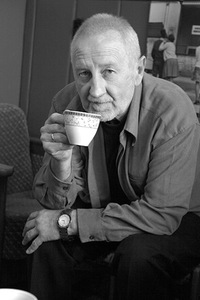Conversation with writer Donaldas Kajokas - mode of life and being according to literary contexts 0
In brief: The Lithuanian National Prize laureate Donaldas Kajokas (1953) creates poetry, writes a wide range and variable volumes of prose texts of different genres and translates - his work areas are broad, the roads branch, but in the end everything is merged in literature. For the conversation with D. Kajokas, the author has chosen thoughts from his works - novel "Ežeras ir kiti jį lydintys asmenys" (Lake and other persons accompanying it, 2012) and collection of poems "Apie vandenis, medžius ir vėjus" (On the water, the trees and the winds, 2015). Thus, literature "asks" the writer...
E. Baužaitė asks the writer what he personally believes to be the meaning of life. To D. Kajokas, the meaning of life is a question of eternal or the cursed strain. “The older I get the more it seems less important to me, maybe even fabricated by the language itself. What am I trying to say here? For example, looking form one angle, the meaning of life is a social sensibility, the improvement of human life, from another angle, it will be creative work, from the third - will and power (spiritual, physical, financial) and from the fourth - the love of God and etc. Walking in a similar direction, I can say that for me, the meaning of life is to live, i.e., not to search for the meaning of life, because when you live - you had never lost it.”
It was interesting to know what the author’s outlook on the irony was (in life and work). D. Kajokas says that “the ability to rally, to have a spot-on wit shows that the person, who has this feature is intelligent, he senses our and the worlds' important reasoning imbalances. However, given too much prominence, this ability shows something else: a refusal to think seriously, till the end. The master of irony is often stuck halfway - he was able to go further than others, to see the controversy of many problems and after seeing it – he surrendered. A constant rallying is an unconscious refusal to address the basic question; the search for truth is replaced by striving for attractiveness, a wish to be liked or to stand-out, as if exclaiming - look, I am!”
The author of the article wonders how the writer sees the young, starting writer's opportunities and initiatives to express him/herself in today's literary world. D. Kajokas says he views the Lithuanian community of writers in a sober way. “It contains many things - real talents, strong artisans and obvious mediocrities. As everywhere and as always. I do not miss the voice of authorities, especially in public, because the writer's task is to write the best possible books, take care of our language and literature and the task of literature is not to transform the world and not to worry about pensions or heating prices. When it was needed, our most authoritative writers climbed on to the barrel and carried out ardent speeches, they became heralds. I am referring here to the revival times. Now writers' should write, politicians should do politics, farmers should sow and mow. God forbid if the time comes again to climb on the barrel and, instead of writing, to call the nation somewhere again.”









